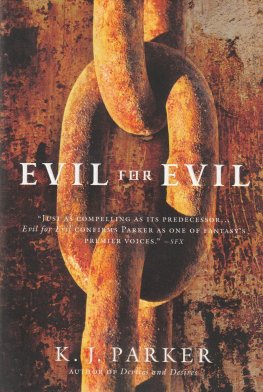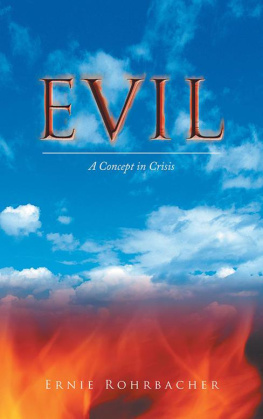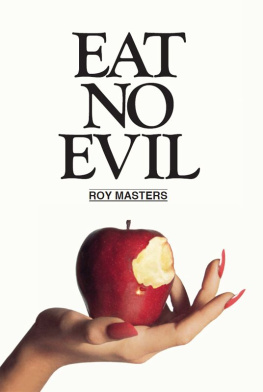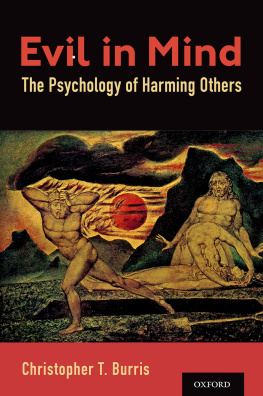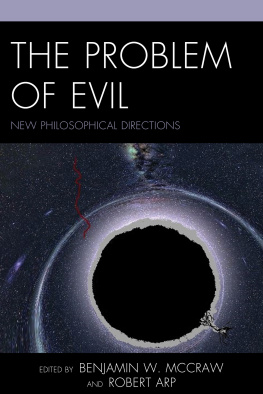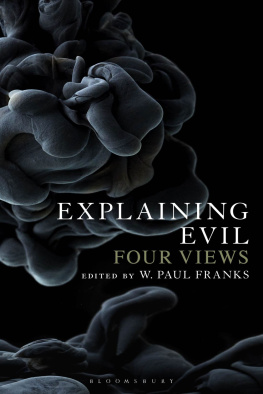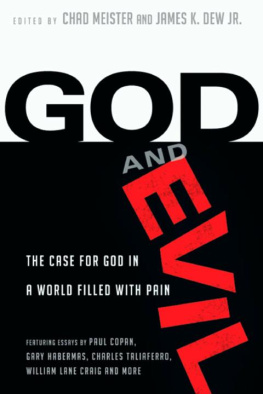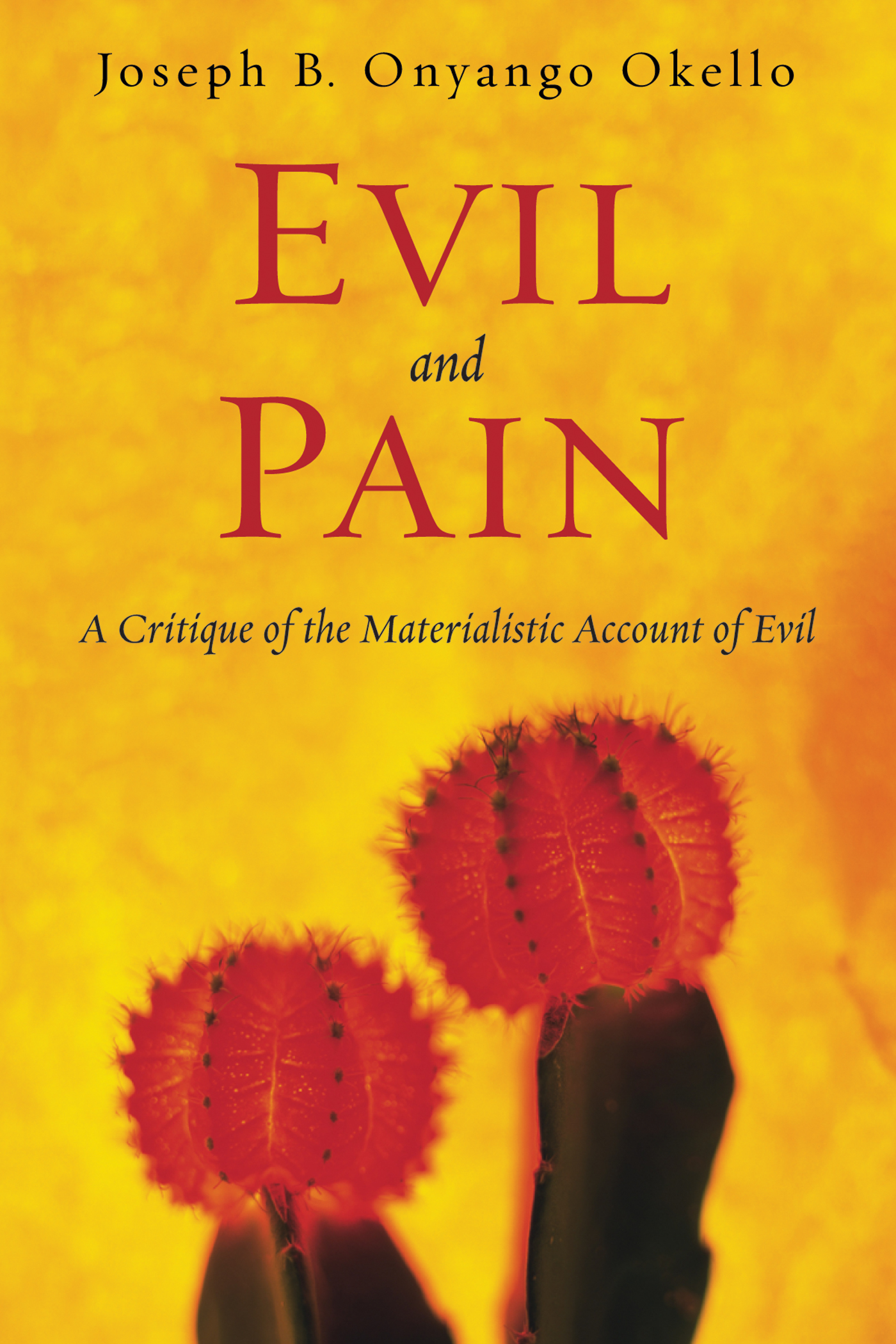Sophie Munyao-Okellomy dear wife who continues to bear witness to Gods glory in the midst of intense suffering
Acknowledgments
S ince my seminary days, I have spent countless hours of reflection on the question of suffering and pain. Various individuals have helped shape my view along the way. One such individual is professor Jerry Walls, who encouraged me to seek higher levels of scholarship in my academic pursuits. Several classes of philosophy with Jerry planted an intellectual seed that spurred the urge for rational inquiry into issues affecting my immediate context, one of them being the major theme of this book.
Also, various encounters with Michael Peterson, professor of philosophy at Asbury Theological Seminary, influenced my thinking in many ways, thereby giving me a road map for developing the personal philosophy represented in this work. I am deeply indebted to Mike for the materials made available by the high level of scholarship exemplified in his works. Whereas I depart, in several ways, from Mikes and Jerrys philosophical assumptions as far as this work is concerned, I still owe both of them a deep gratitude for enabling me to aspire toward higher levels of scholarship.
I am also grateful to David Bradshaw, professor of philosophy at the University of Kentucky, not only for personally guiding me through the process of rigorous thinking that has now shaped my intellectual life, but also for encouraging me, by his example, to avoid the temptation of becoming a lazy scholar. Memories of numerous classroom and office meetings with David haunt me whenever the appetitive aspects of my soul refuse to bow to the dictates of reason.
Besides these world-class scholars, I received great encouragement from faculty and students at Asbury Theological Seminary. Having taught a course on suffering, tragedy, and the Christian faith twice every three years, I am only just now beginning to understand the enormity of the subject. However, students and faculty of Asbury Seminary encouraged me to put my thoughts in writing, sensing that I might have something to say. Well, dear oneshere it is!
Within the Asbury community, I would specifically like to thank Judy Seitz who read the entire manuscript, offered invaluable suggestions for improvement as far as the language and formatting is concerned, and helped save my work from glaring and embarrassing errors. She is definitely a jewel at Asbury Seminary. I must add, however, that any conceptual or grammatical errors that might attend this work are, of course, mine.
I also thank my wonderful wife, Sophie, who always looks at me with bewilderment when I toss philosophical ideas her way. Just the same, she has always encouraged me to pursue academic excellence in spite of her suspicion that my mental faculties have quite possibly run amok. I would not trade her support and wonderful companionship for another. More importantly, Sophie does know the meaning of suffering, owing to her recent battle with cancer and subsequent treatments, which often seem as bad and, perhaps, just as dangerous as the disease itself. Countless trips to different doctors to help her with the healing process have been quite demanding, putting unimaginable strain on her. However, owing to her strong faith in Christ (much stronger than mine, of course), she continues to be an encouragement to my son and me.
The question of pain and suffering, therefore, has not been merely theoretical to my family. It has knocked at our doorstep and remains in our backyard for an indefinite period of time. The fact that it has been with us for this period of time, without question, afflicts us with great concern. Just the same, we still find hope in the one healer coming to us credentialed as the Great Physician. He alone can give us hope where none can be found.
For this reason, I thank my Savior and Redeemer Jesus Christ who conquered evil on the cross. Without him, the hope of finding release from suffering and pain is always an illusion. Without him, this book is a big lie. His promise, however, always stands, and we look forward to the day he will wipe off all our tears from our eyes and take away all the pains and sorrows from our lives.
Introduction
W hat is materialistic hedonism? Broadly construed, it is the view in ethics that, on the one hand, finds pleasure and pain intrinsically good and intrinsically evil, respectively, while on the other, denies the metaphysical vantage point of dualism that thinks of mind as an immaterial entity substantially separate from the physical human body. Whether or not this thesis counts as a necessary truth in the logical sense will be the subject of this investigation. By necessary truth, I refer to the kind of statements that cannot be false under any circumstances, and must, in addition, be true in all possible worlds. This hedonistic understanding of value that characterizes prominent naturalistic materialists, like that alluded to by J. L. Mackie (I describe this more fully in chapter ), semantically seems to entail either a synonymous or a near synonymous relationship between evil and pain.
As noted, the view seems to accept the general postulates of ethical hedonism, contending that all intrinsically desirable things are what we would call pleasure and all intrinsically undesirable things are what we would call pain . More accurately, all things desirable in themselves are pleasant states of mind and all things undesirable in themselves are unpleasant states of mind. Moreover, one state of affairs remains more desirable in itself just in case that state of affairs contains more than another different state of mind. This view believes that the quantity of value in any state of affairs ought to be quantified by the amount of pleasure in it.
According to Richard B. Brandt, philosophers such as Aristippus, Epicurus, Locke, Hobbes, Hume, Bentham, Mill, and Sigdwick defend ethical hedonism in their writings. Some of these philosophers, such as Epicurus, Hume, and Mill accepted the postulates of materialism. The religious suppositions of Locke, however, would have rendered him more of a supernaturalist than a materialist. Additionally, whereas some philosophers made specific references to pleasure in their adumbrations of ethical hedonism, others also factored the idea of happiness into their explications as well. In their view, happiness seemed an intrinsic good. In saying that an individual is happy at any given time, the ethical hedonist really meant the individual in question was experiencing pleasure at the time. Some philosophers, however, felt that happiness was rather different from pleasure, and the debate on whether or not happiness and pleasure are essentially the same continues.
According to Brandt, the hedonist would argue that the intrinsic desirability of a given state of affairs is something determined by the fact that the state of affairs is good, worthy of choice, or worthwhile when taken by itself. The hedonist does not deny that many things are desirable. Still, he or she does not find them desirable in themselves. The hedonist finds those things instrumentally desirable, but certainly not intrinsically desirable. Additionally, the hedonist observes that those things can be both instrumentally and intrinsically desirable. For the hedonist, a thing is instrumentally desirable if it results in later pleasures, and instrumentally undesirable if it yields later pain.


